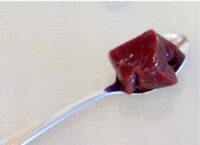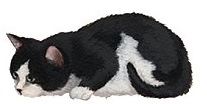

The importance of liver in the diet of the cat is often underestimated.
It is impossible to single out one nutrient or food as being more important than others. All nutrients are important and many are essential to make life possible. However, liver deserves a special mention as a food so dense in nutrients that it almost deserves the title of “miracle food”. The cat’s natural, all prey diet provides her daily with fresh, raw liver. To meet her caloric needs, an adult, wild-living cat would catch and eat 5 mice-sized prey animals daily (mostly rodents). With the average mouse weighing 28g, the wild cat would consume about 140g of prey per day. The liver of a mature mouse weighs 2g, with a total of 10g raw liver consumed by the cat almost every day.
The nutritional content of liver is as complex as the function of the organ itself. Beyond water, protein, and fat, the liver is the only animal tissue, which contains measurable amounts of carbohydrates in the form of Glycogen. Most of all, the liver is known as the richest source of Vitamin A (Retinol) and vitamin D, but is also a good source for many of the B vitamins. Iron is the most abundant trace mineral present in liver, and most of the cat’s requirement for copper and zinc is also meet by the consumption of this organ.
Lets take a closer look at the most significant nutrients in liver, and the reason why it is an indispensable addition to the home prepared feline diet.
The cat must receive Vitamin A as preformed Retinol. The cat is unable to utilize plant based Carotenes to form Vitamin A, although this ability is common in plant eating and omnivorous animals, as well as in humans. Vitamin A is termed Retinol to signify its importance for the normal function of the retina of the eye. Deficiencies of Vitamin A will lead to eye infections, infections of the conjunctiva, and cause night blindness. Vitamin A is most essential in healthy, normal growth, and the formation and maintenance of bones and teeth. Utilization of protein as well as cell growth depends on Vitamin A. Feeding kittens a diet lacking in Vitamin A will soon lead to general un-wellness of the young animals who suffer of infections, poor development and fail to grow and thrive. Vitamin A plays a vital role in the function of the immune system, and as a potent antioxidant it protects the cells against cancer, disease, and aging.
Like Vitamin A, Vitamin D plays an essential role in growth, and normal development of bones and teeth. Without Vitamin D the body would not be able to absorb and utilize Calcium and Phosphorus. Vitamin D also controls some muscle function: protecting against muscle weakness and regulates the heartbeat. It is important for blood clotting and the normal function of the thyroid. Like Vitamin A, Vitamin D greatly enhances the function of the immune system.
The most significant function of iron is the production of Hemoglobin (and production of a type of Hemoglobin in muscle tissue called Hyoglobin) and the oxygenation of the red blood cells. It also is very important for normal growth, function of the immune system, function and production of many enzymes, and energy production in the body.
Without zinc, the synthesis of certain protein and collagen formation in the body would come to a halt. This trace mineral in conjunction with Calcium, Phosphorus, Vitamin A, and Vitamin D is vital for bone growth. It promotes healthy immune function and the healing of wounds. Zinc also fight and prevents the formation of free radicals, and helps to protect the liver from chemical damage. It is a constituent of insulin and many enzymes.
Without liver, healthy growth and the normal formation of bones and teeth would be severely compromised. Even in the adult cat, liver provides some of the building blocks to maintain healthy bones and connective tissue. Without the nutrients in liver, protein utilization and synthesis of non-essential amino acids would be impossible. The overall disease resistance of the cat depends on dietary liver, and so does her ability to fight free radical damage, cancer, and premature aging. The health of the blood, muscle tissue, mucus membranes and the skin would be severely affected by the absence of dietary liver. Finally, without liver, the cat would not be able to maintain her excellent vision.


 Deutsch
Deutsch
